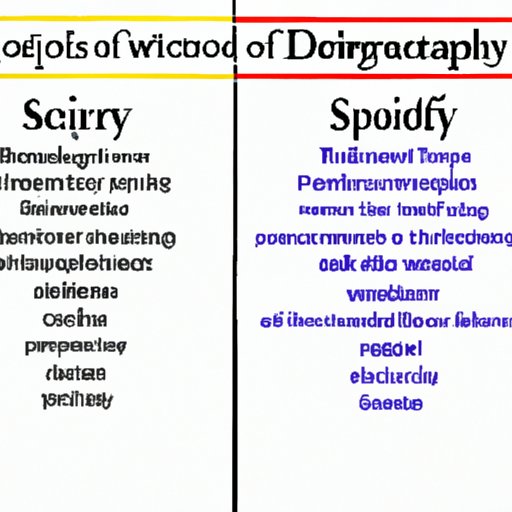Introduction
Scholarly writing focuses on topics that are related to academics and research. It is an important element of academic study and is used in many areas, such as essays, dissertations, and journal articles. The goal of scholarly writing is to present facts, evidence, and theories in a way that is accurate, clear, and concise. In this article, we will explore the definition of scholarly writing, its audience and purpose, and the benefits it has to offer.

Defining Scholarly Writing: An Overview
In order to understand what scholarly writing is, it is important to first understand its definition. Scholarly writing is defined as “the process of researching, organizing, synthesizing, and presenting information in a logical and structured format.” Scholarly writing requires the use of specific types of sources, such as peer-reviewed journals, books, and other reliable sources. It also requires the use of formal language, citations, and appropriate formatting.
Types of Scholarly Writing
Scholarly writing can take many forms, including essays, research papers, book reviews, literature reviews, and dissertations. Each type of scholarly writing has its own set of rules and guidelines that must be followed. For example, essays typically require the use of an argumentative structure, while research papers require the use of a scientific methodology.
Characteristics of Scholarly Writing
The characteristics of scholarly writing are often referred to as the five Cs: clarity, correctness, conciseness, completeness, and citation. Clarity refers to the ability to express ideas clearly and concisely; correctness refers to the accuracy of the information presented; conciseness refers to the ability to communicate information without unnecessary words or details; completeness refers to the inclusion of all relevant information; and citation refers to the use of appropriate sources and references.
Examining the Elements of Scholarly Writing
The elements of scholarly writing include research, analysis, evidence, argumentation, and objectivity. Research is the process of gathering information from reliable sources and analyzing it to develop a deeper understanding of the topic. Analysis involves examining the data and drawing meaningful conclusions. Evidence is the use of facts, statistics, and other information to support arguments. Argumentation is the development of a logical argument based on evidence. Finally, objectivity is the avoidance of personal biases when presenting information.
Analyzing Examples of Scholarly Writing
In order to better understand scholarly writing, it is helpful to examine examples of it. Here are three examples of scholarly writing:
- Example 1: An essay discussing the causes of climate change. The essay includes research from peer-reviewed journals, analysis of data, and evidence to support the argument that human activity is a major contributing factor to climate change.
- Example 2: A dissertation examining the effects of poverty on educational outcomes. The dissertation includes research from multiple reliable sources, analysis of data, and evidence to support the argument that poverty has a negative impact on educational outcomes.
- Example 3: A journal article discussing the importance of physical activity for health. The article includes research from peer-reviewed journals, analysis of data, and evidence to support the argument that physical activity has numerous benefits for physical and mental health.

Exploring the Benefits of Scholarly Writing
Scholarly writing offers a number of benefits, including improved critical thinking skills, enhanced knowledge of a topic, and increased credibility. Through the process of researching, analyzing, and arguing a point, scholars gain a better understanding of the subject matter and become more adept at forming and defending their opinions. Additionally, by using reliable sources and citing them appropriately, scholars are able to establish their credibility and increase their chances of being taken seriously by their peers.

Understanding the Differences Between Scholarly and Popular Writing
It is important to understand the differences between scholarly and popular writing. Popular writing is typically written for a general audience and does not require the use of formal language or citation. On the other hand, scholarly writing is intended for an academic audience and requires the use of formal language and citation. Additionally, scholarly writing utilizes sources such as peer-reviewed journals, books, and other reliable sources, while popular writing may rely on sources such as magazines, newspapers, and blogs.

Tips for Crafting Effective Scholarly Writing
When writing scholarly pieces, there are several tips that can help make the process easier. First, it is important to choose a relevant topic. This will ensure that the piece is interesting and engaging. Second, it is important to utilize appropriate resources. Reliable sources should be used to support arguments and cite evidence. Third, it is important to follow a logical structure. This will help ensure that the piece flows well and is easy to follow. Fourth, it is important to avoid plagiarism. All sources should be cited appropriately. Fifth, it is important to stick to established conventions. This includes using the correct formatting and style guidelines.
Common Mistakes to Avoid When Writing Scholarly Pieces
When writing scholarly pieces, there are several common mistakes to avoid. One of the most common mistakes is improper citation. All sources should be cited accurately and consistently. Another mistake is unclear arguments. Arguments should be clear and supported with evidence. A third mistake is lack of focus. The piece should remain focused on the chosen topic and should not stray off track.
Conclusion
Scholarly writing is an important element of academic study. It involves researching, analyzing, and presenting information in a logical and structured format. By understanding the definition, audience, and purpose of scholarly writing, as well as the elements, examples, and benefits, scholars can craft effective pieces. Additionally, by avoiding common mistakes and following established conventions, scholars can ensure that their work is both accurate and credible.
In conclusion, scholarly writing is an invaluable tool for academic study. It helps scholars develop their critical thinking skills, gain a better understanding of their chosen topics, and establish their credibility. By understanding the definition, audience, and purpose of scholarly writing, as well as the elements, examples, and benefits, scholars can craft effective pieces.
(Note: Is this article not meeting your expectations? Do you have knowledge or insights to share? Unlock new opportunities and expand your reach by joining our authors team. Click Registration to join us and share your expertise with our readers.)
